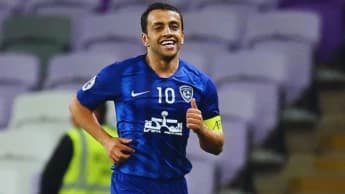Saad Al-Shehri: A Rising Star in Saudi Football Coaching

Saad Al-Shehri has become a pivotal figure in Saudi football, showcasing remarkable coaching skills and a vision for elevating both club and national team performances to new heights.
Saad Al-Shehri is a name that has swiftly gained recognition in the realm of football coaching, particularly in Saudi Arabian football. Born in 1980 in Saudi Arabia, Al-Shehri’s journey through the football landscape has been marked by dedication, passion, and significant achievements. As a coach, his tactical acumen, leadership qualities, and profound understanding of the game have established him as one of the most esteemed figures in Saudi football. Throughout his career, he has successfully transformed teams, ensured consistent performances, and developed competitive squads, all while accumulating invaluable experience that has enhanced his growing reputation.
Al-Shehri began his career as a player, representing different Saudi Arabian clubs at the domestic level. However, it was his shift to coaching that distinguished him. After retiring from playing, Al-Shehri commenced his coaching career with youth teams and eventually got the opportunity to manage senior teams. His coaching credentials flourished when he became the manager of the Saudi Arabia U-23 team. Under his guidance, the U-23 team made remarkable progress, and his success with them earned him the position of head coach for the senior national team.
Al-Shehri's ascent to the position of head coach for the Saudi Arabian national team has been highlighted by significant accomplishments, particularly in his effective management of the team's qualification campaigns for international tournaments. His tactical philosophy emphasizes discipline, flexibility, and a robust defensive structure—qualities that have played a crucial role in defining the team's character during his tenure. His skill in organizing the team's defensive play while promoting counter-attacking strategies has resulted in several notable victories, establishing him as one of the most skilled and promising coaches in the region.
Regarding his coaching philosophy, Al-Shehri focuses on empowering players and nurturing a close bond with his team. He emphasizes the importance of strong team chemistry, ensuring that his players are motivated and prepared both mentally and physically for upcoming challenges. His commitment to his work and his ability to instill a winning mindset within the teams he leads are central to his coaching approach, earning him great respect from both players and fellow coaches.
In addition to his success with the national team, Al-Shehri has garnered acclaim for his contributions to club teams in Saudi Arabia. His leadership roles with various domestic clubs have established him as a figure adept at building competitive teams that can vie for top honors in the Saudi Pro League. His contributions in the country have been instrumental in influencing the future of football in the region, with many considering him a vital player in the evolution of the sport.
As he continues to advance in his coaching career, Saad Al-Shehri is recognized as a visionary in Saudi football. His achievements at both youth and senior levels, combined with his tactical acumen and leadership skills, have solidified his reputation as a leading figure in Saudi Arabian football. With a focus on the future and ongoing success ahead, Saad Al-Shehri is a person to watch as he strives to further cement his legacy in the realm of football coaching.
Tactical Philosophy & Approach
Saad Al-Shehri’s coaching philosophy and approach to football illustrate his profound comprehension of the sport and his skill in adjusting to various challenges. As a manager, Al-Shehri has earned a reputation for his disciplined, structured, and adaptable style, which has led to considerable success with both club and national teams. His strategy focuses on a robust defensive framework, high pressing, rapid transitions, and a well-balanced team dynamic that guarantees both defensive reliability and offensive fluidity.
Central to Al-Shehri’s tactical approach is a well-structured defensive system. He emphasizes that a strong defensive core is essential for a successful team, focusing on preserving shape and discipline throughout the match. Teams under his direction are recognized for their compactness, which poses challenges for opponents attempting to penetrate the defense. Al-Shehri frequently employs a 4-4-2 or 4-3-3 formation, ensuring stability in the defense while enabling swift transitions to offensive play. His teams are trained to apply high pressure when they lose possession, seeking to quickly regain the ball and disrupt the opposition’s attacking flow. This high-pressing strategy is a fundamental aspect of Al-Shehri’s philosophy, facilitating his teams' ability to recover possession in advanced positions and generate immediate scoring opportunities.
Al-Shehri’s focus on pressing goes beyond merely closing down space; it aims to provoke errors from the opposing team. His players are trained to foresee their opponent's actions, positioning themselves effectively to obstruct passing pathways and apply pressure at opportune times. This style of high pressing demands discipline and exemplary coordination, with every player aware of their responsibilities during both defensive and transitional situations. By employing high pressing, Al-Shehri’s squads strive to regain possession swiftly and take advantage of any defensive weaknesses of their rivals.
Al-Shehri promotes fluid attacking play while ensuring balance in possession. His strategy is not solely focused on holding the ball, but instead emphasizes the effective use of the ball to generate goal-scoring opportunities. His teams are recognized for making swift passes, transitioning rapidly from defense to offense, and using width to stretch the opposing team. The full-backs within his system play a crucial role in both attacking and defensive scenarios, providing width and delivering crosses into the box when required. Meanwhile, the central midfielders are tasked with controlling the game’s tempo, acting as a connection between defense and attack while playing a vital role in winning second balls and disrupting opposition counter-attacks.
A fundamental aspect of Al-Shehri's tactical philosophy is adaptability. He recognizes that varying opponents demand distinct strategies, prompting him to customize his approach in line with the strengths and weaknesses of his rivals. In crucial matches, Al-Shehri might choose a more conservative strategy, implementing a deeper defensive setup and emphasizing counter-attacking football. This adaptability is a key factor in his success with both youth and senior teams, as his capability to modify tactics according to the match's requirements establishes him as a versatile and effective manager.
A significant element of Al-Shehri’s philosophy is the focus on teamwork and shared responsibility. Although individual talent is vital, Al-Shehri is convinced that a successful team relies on the combined efforts of all its members. He places a high priority on team chemistry, ensuring that each player comprehends their role within the system. The coach also promotes a culture of accountability, requiring every player to contribute on both offense and defense. This comprehensive approach guarantees that players not only recognize their individual tasks but also grasp the broader context of how the team operates collectively.
When it comes to attacking play, Al-Shehri’s strategy focuses on taking advantage of the width of the pitch, making use of wingers and full-backs to stretch the opposing defense. His teams are trained to create numerical advantages in wide areas by employing quick combinations to dismantle defensive structures. The forwards in his system are also encouraged to make smart runs into the box and take advantage of crosses delivered from wide positions. This strategy offers a range of attacking options, enabling the team to generate opportunities from both central and wide areas.
Al-Shehri's tactical strategy emphasizes the significance of set-pieces, focusing heavily on enhancing the team's performance during dead-ball scenarios. Whether on the defense or offense during set-pieces, Al-Shehri ensures that his teams are thoroughly trained and ready to seize opportunities. He prioritizes organizing the team defensively to thwart opponents from scoring via set-pieces, while also positioning his players effectively to capitalize on set-piece deliveries.
Saad Al-Shehri’s tactical philosophy is marked by a balanced, disciplined, and adaptable style of play. His emphasis on defensive strength, high pressing, and quick transitions makes his teams hard to break down while consistently posing an offensive threat. His ability to adjust tactics according to the opposition, combined with a commitment to teamwork and shared responsibility, enhances his effectiveness as a manager. Al-Shehri’s success comes from creating a structured yet fluid playing style, which is likely to continue influencing the future of Saudi football under his guidance.
Team Management & Athlete Development
Saad Al-Shehri’s management style and commitment to player development have been key factors in his success as a coach. His skill in balancing the needs of the team, nurturing talent, and sustaining high motivation among players has played a crucial role in his accomplishments, both at the club and international levels. Al-Shehri emphasizes building a strong, unified team, while his strategies in player development ensure that each individual continues to grow and reach their full potential.
Al-Shehri places significant importance on squad balance, understanding the value of combining experience with youth in his teams. His approach focuses on constructing a squad that is not only competitive but also harmonious, where every player is aware of their role within the team. He stresses the necessity of squad depth, ensuring that reliable backups are available for every position, and that players are rotated effectively to maintain their freshness throughout the demands of a lengthy season. This equilibrium between experienced and younger players is particularly vital during international tournaments, where a blend of established players and rising stars is essential to successfully handle the challenges of high-pressure matches.
In terms of squad rotation, Al-Shehri adopts a practical strategy. He is willing to alter the starting lineup based on the opponent and the players' physical states. Nevertheless, his choices always stem from meticulous evaluation, guaranteeing that the modifications do not disturb the team’s overall flow. He appreciates consistency within his squad but understands that maintaining players' freshness and motivation over an extended season necessitates rotation. This method fosters a competitive environment, as players are aware that their on-field performance will influence their positions in the starting lineup.
Al-Shehri’s approach to player development focuses on cultivating talent from an early age and guiding players as they advance through the ranks. He has consistently demonstrated a dedication to promoting young athletes, offering them chances to display their abilities in both national and international events. His experience with the Saudi Arabian U-23 team highlights his skill in nurturing young talent, as many of his players have progressed to the senior national team. Al-Shehri is recognized for his meticulous work with up-and-coming players, assisting them in enhancing their technical, tactical, and mental skills.
A significant aspect of Al-Shehri’s player development is his ability to customize his methods to the unique needs of each player. He dedicates time to comprehend the strengths and weaknesses of his players, providing tailored guidance to facilitate their improvement. Whether it’s a young talent aspiring to join the first team or a seasoned professional aiming to sustain peak performance, Al-Shehri guarantees that every player gets the support they require to progress. His thorough analysis of each player’s performance enables him to apply targeted training techniques and exercises that concentrate on their developmental needs.
Besides enhancing individual skills, Al-Shehri places a strong emphasis on the mental aspect of player development. He recognizes that the psychological factors of the game are as crucial as technical abilities, and he collaborates closely with his players to build their confidence, resilience, and mental fortitude. Al-Shehri promotes a culture of growth and self-improvement within his teams, motivating players to challenge themselves both physically and mentally. This comprehensive approach to player development ensures that his players are not only technically skilled but also mentally equipped to face the challenges on the field.
Al-Shehri's management of the team is characterized by his ability to foster a positive team culture. He cultivates a sense of unity and camaraderie among his players, making sure that there is a strong bond within the team. This is essential in high-pressure scenarios, as a cohesive squad can navigate challenges and perform effectively under stress. Al-Shehri promotes open lines of communication between players and coaches, establishing an atmosphere where players are comfortable sharing their thoughts and discussing tactical concepts. His leadership style is rooted in mutual respect, and he is well-known for being approachable and supportive of his players.
Additionally, Al-Shehri's experience with different clubs and the national team has enabled him to create a network of contacts within the football community, giving him the ability to spot potential talent throughout the region. His scouting techniques are meticulous, and he consistently seeks out players who can enhance his team. Be it identifying young talent in local leagues or evaluating players from other areas, Al-Shehri ensures that his team is continuously evolving and improving.
Saad Al-Shehri's management of the squad and his strategies for player development have been pivotal to his success as a coach. His skill in balancing experience with youth, effectively rotating his roster, and fostering individual talent has allowed him to create competitive teams. By emphasizing personalized player growth and dedicating himself to cultivating a positive team culture, he ensures that his players consistently improve and remain motivated. Al-Shehri's methods in squad management and player development have established him as one of the most respected and successful coaches in the region.
Crucial Matches & Performance Insights
Saad Al-Shehri’s time as a coach has been characterized by a number of significant matches and performance patterns that showcase his tactical insight, flexibility, and capacity to perform under pressure. Throughout his coaching journey, Al-Shehri has faced various high-pressure situations, both in international tournaments and domestic leagues, demonstrating his talent for maximizing his teams' performances. These pivotal matches not only highlight his strategic choices but also illustrate how his teams adapt to different challenges.
A key moment in Al-Shehri’s career occurred during the 2020 Tokyo Olympic Games, when he guided the Saudi Arabian U-23 team to a groundbreaking qualification for the knockout phases of the tournament. This accomplishment was significant for Saudi football, as the team had previously failed to advance beyond the group stage in earlier versions of the competition. Al-Shehri’s tactical arrangements were crucial for securing this progress. His capacity to equip the team for the distinct challenges posed by opponents of a higher ranking demonstrated his profound understanding of managing high-pressure situations. The team's performance throughout this event was characterized by disciplined defending, rapid counter-attacks, and a unified team spirit, showcasing Al-Shehri’s emphasis on tactical precision and collaboration among players.
Another pivotal match in Al-Shehri’s career was a vital World Cup qualifying game between Saudi Arabia and Japan in 2022. This match marked a turning point for the national team, as it provided a significant test of their resilience and Al-Shehri’s strategic adaptability. Japan, with its rapid and skillful playing style, presented a considerable challenge to Saudi Arabia’s ambitions of World Cup qualification. Al-Shehri’s strategy combined defensive strength with quick transitions, enabling his team to counteract Japan’s attacking threats while seizing opportunities on counterattacks. The match concluded in a hard-fought draw, regarded as a favorable outcome for Saudi Arabia, which helped them keep their World Cup qualification hopes alive. Al-Shehri’s capacity to manage expectations and adjust his tactics in response to the game’s dynamics was instrumental in achieving this crucial point.
In the domestic arena, Al-Shehri has demonstrated effective management of club teams, especially within the Saudi Pro League, evidenced by robust performances in critical matches. His tenure with Al-Qadisiyah serves as a prime example, where he successfully led the team through a challenging season to secure a commendable mid-table finish, despite facing resource limitations. Al-Shehri's ability to maximize his players' potential was central to the team’s success, as he implemented a pragmatic strategy focusing on solid defensive structures and efficient counter-attacks. Significant victories during this time, particularly against more established teams, highlighted his talent for outsmarting opponents with greater resources through tactical discipline and careful planning.
Al-Shehri’s strategy in crucial matches reflects his ability to maintain a balanced style of play, adapting to the strengths and weaknesses of his opponents. A notable trend in his performance is his reliability in high-pressure situations. Whether coaching the national team or a club team, Al-Shehri’s squads typically excel under stress, often showcasing resilience and composure during pivotal moments in the games. This underscores his psychological preparation for both himself and his players, ensuring they remain focused and calm when the stakes are elevated.
Al-Shehri's performance trends also highlight his strategic use of substitutions and in-game adjustments. He is recognized for his ability to read matches and implement tactical changes at crucial moments, often shifting the momentum of a game in favor of his team. His substitutions are generally carefully considered, whether aimed at strengthening the defense, introducing new energy to the attack, or stabilizing the midfield to dictate the game's pace. This tactical versatility has been one of his major assets, enabling his teams to respond effectively to various in-game situations and opponents.
A notable aspect of Al-Shehri's performances is his emphasis on team unity. Whether competing in local leagues or international events, his teams typically function as a cohesive unit instead of depending on individual talent. This strategy has enabled his teams to navigate obstacles and secure favorable outcomes, particularly in crucial matches. His dedication to fostering a strong team spirit is reflected in his management style, as players regularly embrace his tactical approach and strive for the collective objective.
Saad Al-Shehri's significant matches and performance trends reveal his strategic acumen, adaptability, and the consistent standards he upholds within his teams. His achievements in both international tournaments and domestic leagues underscore his capability to handle pressure, adjust tactics effectively, and foster team cohesion. Al-Shehri's tactical adaptability, mental preparation, and ability to make in-game modifications have been vital in influencing his teams' performances during some of the most crucial matches of his career. These aspects have contributed to establishing his reputation as a prominent coach in Saudi Arabian football.
Future Opportunities
Saad Al-Shehri's future in football management appears promising, thanks to his impressive history, tactical acumen, and talent for developing players and teams. His experience at both club and national levels positions him for ongoing success, particularly as Saudi Arabian football continues to progress and gain recognition internationally. As the head coach of the Saudi Arabian national team, his future success is closely connected to his ability to guide the team towards greater accomplishments, especially in significant international tournaments like the AFC Asian Cup and the FIFA World Cup.
One of Al-Shehri's most important opportunities is his capability to continue leading Saudi Arabia towards success on the international stage. His experience in global competitions, including the AFC Asian Cup and World Cup qualifiers, serves as a strong foundation for future ambitions. As the national team steadily improves under his guidance, Al-Shehri will likely focus on assembling a squad that can compete against the top teams in Asia and beyond. His dedication to nurturing young talent and incorporating them into the senior team positions him favorably to create a squad that combines experience with the vitality and promise of younger players.
Furthermore, Saudi Arabia's initiative to improve its football infrastructure and boost investment in the sport presents Al-Shehri with distinct opportunities. The nation's increased emphasis on football development and the growth of its domestic leagues will equip him with additional resources and a broader talent pool to draw from. This complements Al-Shehri's strengths in player development and team management, as he has demonstrated a capacity to nurture young, emerging talent effectively.
As football in Saudi Arabia continues to gain international recognition, Al-Shehri may play a pivotal role in attracting top talent to the league. His achievements with the national team could inspire more international players and coaches to view the Saudi Pro League as an appealing option. His tactical intelligence and leadership skills make him an appealing figure in both domestic and global football communities. This could open up future avenues for Al-Shehri to pursue greater challenges, either within the Saudi league or possibly abroad if a suitable opportunity presents itself.
Al-Shehri’s future prospects are also contingent upon his ongoing development as a coach. The world of football is always in flux, making it essential to remain at the forefront of tactical advancements. Al-Shehri has demonstrated flexibility in his methodologies, and his capacity to learn from both achievements and challenges will significantly influence his future path. Continuing to achieve success with both the national team and club sides will further enhance his reputation, potentially leading to opportunities in more prestigious leagues and competitions.
Another significant future opportunity for Al-Shehri is his ability to shape the next generation of coaches in Saudi Arabia and the broader Arab world. His journey from player to successful coach serves as a model for young, aspiring coaches eager to make an impact in football. By consistently achieving positive outcomes and demonstrating his strategic knowledge, Al-Shehri has the potential to become a key figure in the advancement of football coaching in the region.
Saad Al-Shehri's future is brimming with possibilities, particularly regarding his ongoing achievements with the Saudi Arabian national team and the wider football community. His emphasis on player development, tactical adaptability, and leadership skills positions him for even greater triumphs in the years ahead. As Saudi Arabian football continues to evolve, Al-Shehri's influence in advancing the sport in the region will be crucial, and his ongoing development as a coach will shape his career path and the success of his teams.






